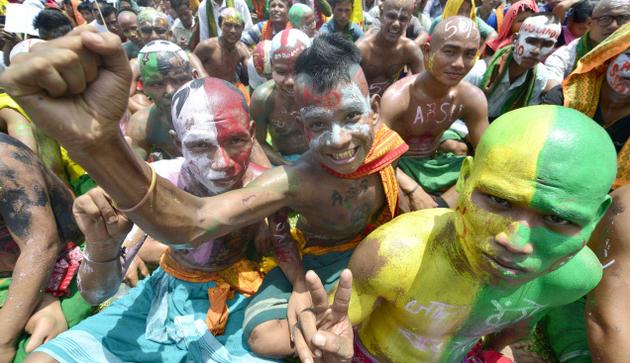 August 25;Assam’s ethnic pot is boiling once again with the United Progressive Alliance’s nod to create a Telangana State, spurring the revival of statehood movements by four ethnic groups — the Bodos, the Karbis, the Dimasas and the Koch-Rajbangshis.
August 25;Assam’s ethnic pot is boiling once again with the United Progressive Alliance’s nod to create a Telangana State, spurring the revival of statehood movements by four ethnic groups — the Bodos, the Karbis, the Dimasas and the Koch-Rajbangshis.
While organisations of the Koch-Rajbangshis have demanded a Kamatapur state comprising 15 districts of Assam and six of West Bengal, the other three demands have been raised from the Bodoland Territorial Area District (BTAD), Karbi Anglong hill district and Dima Hasao (the erstwhile North Cachar) hill district which are governed by administrative set-ups enjoying legislative, executive and financial autonomy under the Sixth Schedule to the Constitution.
The revival of the statehood movements raises the question whether its autonomy experiment — thought to be the panacea for addressing territory-linked ethno-linguistic and ethno-cultural identity issues — has failed.
Political elites among the Bodos, the Karbis and the Dimasas argue that the Sixth Schedule experiment failed to fulfil the aspirations of the people in the three areas as the State government did not fully devolve powers on the councils as promised.
Meanwhile, ordinary Bodo, Karbi and Dimasa people never got any opportunity to enjoy self-governance as no power was handed to villages.
The autonomous institutions in the three Sixth Schedule areas of BTAD, Karbi Anglong and Dima Hasao — namely the Bodoland Territorial Council (BTC), the Karbi Anglong Autonomous Council (KAAC) and the Dima Hasao District Autonomous Council (DHDAC) — are single-tiered and outside the purview of the Panchayati Raj system.
Since the ad hoc village council bodies are not elected, villagers have remained passive beneficiaries of development schemes and do not have any say when allocated funds fail to reach them.
In Tripura, nominated village committees were replaced with elected councils in 2006 in all 527 village committees under the Tribal Areas Autonomous District Council (TTADC). The TTADC, which came under the purview of the Sixth Schedule in August 1985, also vested with the elected Village Committees the powers and duties for implementation of State and Central development schemes. There is 33 per cent reservation for women in these committees.
Nearly nine years after the formation of the BTC, the Bodoland Village Council Bill, 2012, which provides for a directly elected council, was passed on July 18, 2012. The Bill still awaits the Assam Governor’s assent.
The peace accord signed by the Centre and Assam governments with the erstwhile militant outfit United People’s Democratic Solidarity (UPDS) of Karbi Anglong hill district on August 25, 2011 provides for setting up of village councils under the Karbi Anglong Autonomus Council (KAAC) to deepen the democratic process at the grassroots. The Memorandum of Settlement signed with both factions of the erstwhile militant outfit Dima Halam Daogah(DHD) of Dima Hasao hill district on October 8, 2012 also provides for setting up of village councils for devolution of powers on the grassroots to benefit all sections.
The State government has allowed the Bill and the two peace accords to gather dust instead of ensuring their speedy implementation. Failure on the part of the Centre and Assam governments to make the Sixth Schedule an effective institution with wider participation of the people has allowed the political elites of the three tribes to seize the opportunity created by the Telangana decision, to revive the statehood demand and articulate it as the only means of getting rid of backwardness and for the preservation of their identity, culture and heritage.
